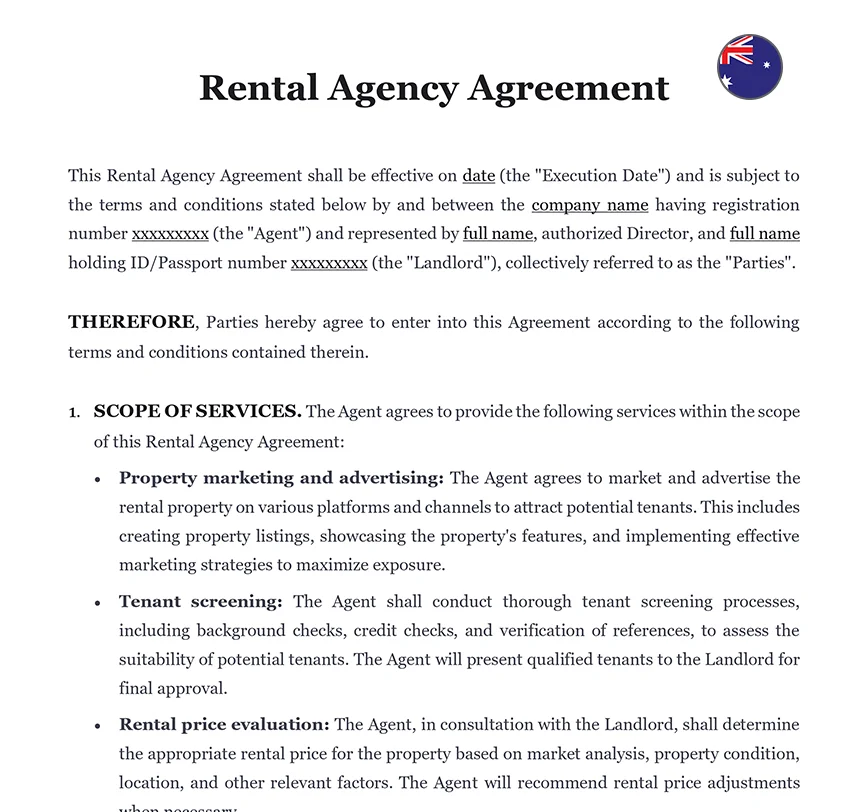Ready to use legal template
Drafted by experienced lawyers
Compliant with Australian law
Ready to use legal template
Drafted by lawyers
Compliant with Australian law
Home › Rent your property › Rental Agency Agreement
Learn more about Rental Agency Agreement in Australia
A Rental Agency Agreement is a legally binding contract between a property owner (landlord) and a rental agency, outlining the terms and conditions under which the agency will have the exclusivity or not to manage the property on behalf of the landlord. This agreement typically covers responsibilities such as finding and screening tenants, collecting rent, property maintenance, and handling tenant issues. Themis Partner provides an easy-to-edit legal template drafted by our legal experts to ensure compliance with Australian laws. This template simplifies the process of creating a Rental Agency Agreement, providing peace of mind for both landlords and rental agencies.
Table of contents
-
-
What are the duties and responsibilities of the rental agency?
-
What should a Rental Agency Agreement include?
-
How is the commission or fee structure determined in Australia?
-
Does this agreement provide exclusivity or non-exclusivity to the rental agency?
-
What happens if there is a dispute between the landlord and the tenant?
-
How does the renewal process work for the Rental Agency Agreement in Australia?
-
Can the landlord terminate the agreement if they are dissatisfied with the services?
-
How does the rental agency handle the advertising of the property in Australia?
-
What are the duties and responsibilities of the rental agency?
Rental agencies play a crucial role in managing rental properties on behalf of landlords. Their duties and responsibilities encompass various tasks throughout the rental process. Primarily, rental agencies are responsible for marketing rental properties effectively to attract potential tenants. This includes tasks such as creating property listings, advertising on various platforms, and organizing property viewings.
Once potential tenants express interest, rental agencies conduct screening processes to ensure suitability. This involves background checks, rental history verification, and assessing financial stability. Additionally, they facilitate lease negotiations between landlords and tenants, ensuring terms are fair and legally compliant.
Throughout the tenancy, rental agencies manage ongoing responsibilities such as rent collection, property maintenance coordination, and addressing tenant inquiries or concerns. They conduct regular property inspections to ensure compliance with lease agreements and address any maintenance issues promptly. Effective communication between all parties involved—landlords, tenants, and contractors—is another vital responsibility of rental agencies.
What should a Rental Agency Agreement include?
A comprehensive Rental Agency Agreement is essential to establish clear expectations and responsibilities between the landlord and the rental agency. Key components of such an agreement include:
| ➤ Identification of the parties involved, including the landlord(s) and the rental agency. |
| ➤ Scope of services provided by the rental agency, outlining tasks such as property marketing, tenant screening, lease negotiation, and ongoing property management./td> |
| ➤ Duration of the agreement, specifying the start and end dates, as well as provisions for renewal or termination. |
| ➤Commission or fee structure, including details of any upfront fees, ongoing management fees, and incentives. |
| ➤Responsibilities and obligations of both parties, such as communication protocols, reporting requirements, and dispute resolution procedures. |




